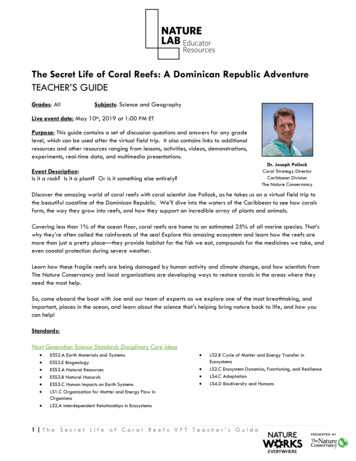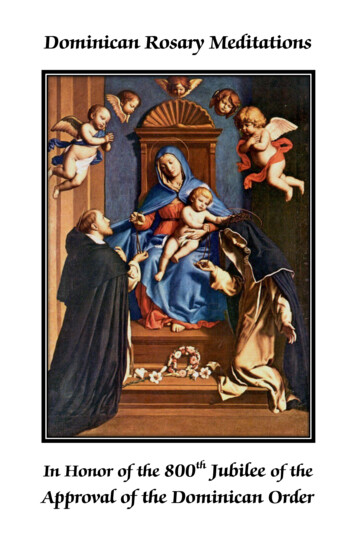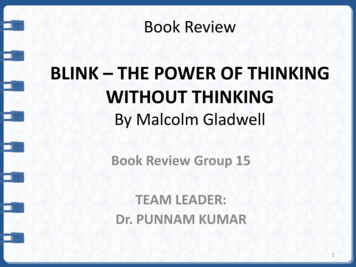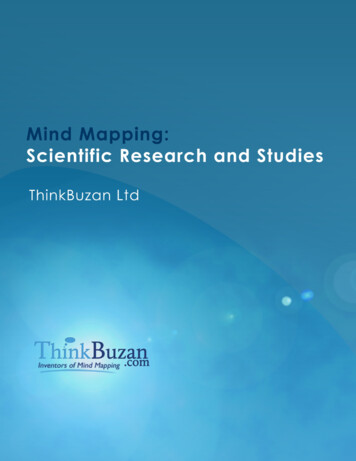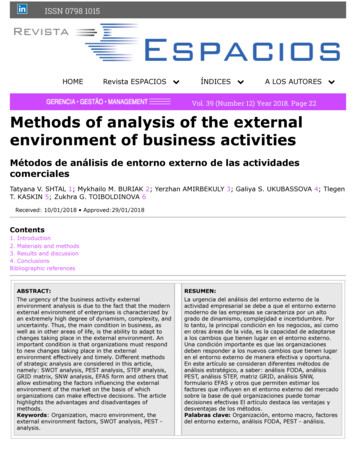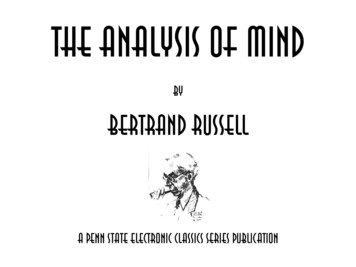
Transcription
The Analysis of MindbyBertrand RussellA Penn State Electronic Classics Series Publication
The Analysis of Mind by Bertrand Russell is a publication of the Pennsylvania State University. This Portable Document file is furnished free and without any charge of any kind. Anyperson using this document file, for any purpose, and in any way does so at his or her ownrisk. Neither the Pennsylvania State University nor Jim Manis, Faculty Editor, nor anyoneassociated with the Pennsylvania State University assumes any responsibility for the material contained within the document or for the file as an electronic transmission, in any way.Put Title Here, the Pennsylvania State University, Electronic Classics Series, Jim Manis, FacultyEditor, Hazleton, PA 18201-1291 is a Portable Document File produced as part of an ongoing student publication project to bring classical works of literature, in English, to free andeasy access of those wishing to make use of them.Cover Design: Jim ManisCopyright 2001 The Pennsylvania State UniversityThe Pennsylvania State University is an equal opportunity university.
ContentsMUIRHEAD LIBRARY OF PHILOSOPHY . 4PREFACE . 5THE ANALYSIS OF MIND. 7LECTURE I. RECENT CRITICISMS OF “CONSCIOUSNESS” . 7LECTURE II. INSTINCT AND HABIT . 29LECTURE III. DESIRE AND FEELING . 41LECTURE IV. INFLUENCE OF PAST . 54HISTORY ON PRESENT OCCURRENCES IN LIVING ORGANISMS . 54LECTURE V. PSYCHOLOGICAL AND PHYSICAL CAUSAL LAWS . 65LECTURE VI. INTROSPECTION . 75LECTURE VII. THE DEFINITION OF . 86PERCEPTION . 86LECTURE VIII. SENSATIONS AND IMAGES . 95LECTURE IX. MEMORY . 109LECTURE X. WORDS AND MEANING . 131LECTURE XI. GENERAL IDEAS . 149AND THOUGHT . 149LECTURE XII. BELIEF . 161LECTURE XIII. TRUTH AND FALSEHOOD . 177LECTURE XIV. EMOTIONS AND WILL . 196LECTURE XV. CHARACTERISTICS OF MENTAL PHENOMENA . 201
Bertrand RussellThe Analysis ofMindcontribution to the History of Modern Philosophy underthe heads: first of Different Schools of Thought—Sensationalist, Realist, Idealist, Intuitivist; secondly of different Subjects—Psychology, Ethics, Aesthetics, Political Philosophy,Theology. While much had been done in England in tracingthe course of evolution in nature, history, economics, moralsand religion, little had been done in tracing the developmentof thought on these subjects. Yet ‘the evolution of opinion ispart of the whole evolution’.“By the co-operation of different writers in carrying outthis plan it was hoped that a thoroughness and completenessof treatment, otherwise unattainable, might be secured. It wasbelieved also that from writers mainly British and Americanfuller consideration of English Philosophy than it had hitherto received might be looked for. In the earlier series of bookscontaining, among others, Bosanquet’s “History of Aesthetic,”Pfleiderer’s “Rational Theology since Kant,” Albee’s “Historyof English Utilitarianism,” Bonar’s “Philosophy and PoliticalEconomy,” Brett’s “History of Psychology,” Ritchie’s “Natural Rights,” these objects were to a large extent effected.“In the meantime original work of a high order was beingproduced both in England and America by such writers as Bra-byBertrand Russell1921MUIRHEAD LIBRARY OF PHILOSOPHYAn admirable statement of the aims of the Library of Philosophy was provided by the first editor, the late Professor J.H. Muirhead, in his description of the original programmeprinted in Erdmann’s History of Philosophy under the date1890. This was slightly modified in subsequent volumes totake the form of the following statement:“The Muirhead Library of Philosophy was designed as a4
The Analysis of MindPREFACEdley, Stout, Bertrand Russell, Baldwin, Urban, Montague, andothers, and a new interest in foreign works, German, Frenchand Italian, which had either become classical or were attracting public attention, had developed. The scope of the Librarythus became extended into something more international, andit is entering on the fifth decade of its existence in the hope thatit may contribute to that mutual understanding between countries which is so pressing a need of the present time.”The need which Professor Muirhead stressed is no less pressing to-day, and few will deny that philosophy has much todo with enabling us to meet it, although no one, least of allMuirhead himself, would regard that as the sole, or even themain, object of philosophy. As Professor Muirhead continues to lend the distinction of his name to the Library of Philosophy it seemed not inappropriate to allow him to recall usto these aims in his own words. The emphasis on the historyof thought also seemed to me very timely; and the number ofimportant works promised for the Library in the very nearfuture augur well for the continued fulfilment, in this andother ways, of the expectations of the original editor.H. D. LewisThis book has grown out of an attempt to harmonize twodifferent tendencies, one in psychology, the other in physics,with both of which I find myself in sympathy, although atfirst sight they might seem inconsistent. On the one hand,many psychologists, especially those of the behaviourist school,tend to adopt what is essentially a materialistic position, as amatter of method if not of metaphysics. They make psychology increasingly dependent on physiology and external observation, and tend to think of matter as something much moresolid and indubitable than mind. Meanwhile the physicists,especially Einstein and other exponents of the theory of relativity, have been making “matter” less and less material. Theirworld consists of “events,” from which “matter” is derived bya logical construction. Whoever reads, for example, ProfessorEddington’s “Space, Time and Gravitation” (Cambridge University Press, 1920), will see that an old-fashioned materialism can receive no support from modern physics. I think thatwhat has permanent value in the outlook of the behaviouristsis the feeling that physics is the most fundamental science at5
Bertrand Russellpresent in existence. But this position cannot be called materialistic, if, as seems to be the case, physics does not assumethe existence of matter.The view that seems to me to reconcile the materialistictendency of psychology with the anti-materialistic tendencyof physics is the view of William James and the Americannew realists, according to which the “stuff ” of the world isneither mental nor material, but a “neutral stuff,” out of whichboth are constructed. I have endeavoured in this work to develop this view in some detail as regards the phenomena withwhich psychology is concerned.My thanks are due to Professor John B. Watson and to Dr.T. P. Nunn for reading my MSS. at an early stage and helpingme with many valuable suggestions; also to Mr. A.Wohlgemuth for much very useful information as regardsimportant literature. I have also to acknowledge the help ofthe editor of this Library of Philosophy, Professor Muirhead,for several suggestions by which I have profited.The work has been given in the form of lectures both inLondon and Peking, and one lecture, that on Desire, has beenpublished in the Athenaeum.There are a few allusions to China in this book, all of whichwere written before I had been in China, and are not intendedto be taken by the reader as geographically accurate. I haveused “China” merely as a synonym for “a distant country,”when I wanted illustrations of unfamiliar things.Peking, January 1921.6
The Analysis of MindTHE ANALYSIS OF MIND(1) Direct reasons, derived from analysis and its difficulties;(2) Indirect reasons, derived from observation of animals(comparative psychology) and of the insane and hysterical(psycho-analysis).LECTURE I. RECENT CRITICISMS OF“CONSCIOUSNESS”Few things are more firmly established in popular philosophy than the distinction between mind and matter. Thosewho are not professional metaphysicians are willing to confess that they do not know what mind actually is, or howmatter is constituted; but they remain convinced that there isan impassable gulf between the two, and that both belong towhat actually exists in the world. Philosophers, on the otherhand, have maintained often that matter is a mere fictionimagined by mind, and sometimes that mind is a mere property of a certain kind of matter. Those who maintain thatmind is the reality and matter an evil dream are called “idealists”—a word which has a different meaning in philosophyfrom that which it bears in ordinary life. Those who arguethat matter is the reality and mind a mere property of protoplasm are called “materialists.” They have been rare amongphilosophers, but common, at certain periods, among menTHERE ARE CERTAIN OCCURRENCES which we are in the habit ofcalling “mental.” Among these we may take as typical believing and desiring. The exact definition of the word “mental”will, I hope, emerge as the lectures proceed; for the present, Ishall mean by it whatever occurrences would commonly becalled mental.I wish in these lectures to analyse as fully as I can what it is thatreally takes place when we, e.g. believe or desire. In this firstlecture I shall be concerned to refute a theory which is widelyheld, and which I formerly held myself: the theory that the essence of everything mental is a certain quite peculiar somethingcalled “consciousness,” conceived either as a relation to objects, oras a pervading quality of psychical phenomena.The reasons which I shall give against this theory will bemainly derived from previous authors. There are two sorts ofreasons, which will divide my lecture into two parts7
Bertrand Russellof science. Idealists, materialists, and ordinary mortals havebeen in agreement on one point: that they knew sufficientlywhat they meant by the words “mind” and “matter” to beable to conduct their debate intelligently. Yet it was just inthis point, as to which they were at one, that they seem to meto have been all alike in error.The stuff of which the world of our experience is composed is, in my belief, neither mind nor matter, but something more primitive than either. Both mind and matter seemto be composite, and the stuff of which they are compoundedlies in a sense between the two, in a sense above them both,like a common ancestor. As regards matter, I have set forthmy reasons for this view on former occasions,* and I shall notnow repeat them. But the question of mind is more difficult,and it is this question that I propose to discuss in these lectures. A great deal of what I shall have to say is not original;indeed, much recent work, in various fields, has tended toshow the necessity of such theories as those which I shall beadvocating. Accordingly in this first lecture I shall try to givea brief description of the systems of ideas within which ourinvestigation is to be carried on.If there is one thing that may be said, in the popular estimation, to characterize mind, that one thing is “consciousness.” We say that we are “conscious” of what we see and hear,of what we remember, and of our own thoughts and feelings.Most of us believe that tables and chairs are not “conscious.”We think that when we sit in a chair, we are aware of sitting init, but it is not aware of being sat in. It cannot for a momentbe doubted that we are right in believing that there is somedifference between us and the chair in this respect: so muchmay be taken as fact, and as a datum for our inquiry. But assoon as we try to say what exactly the difference is, we become involved in perplexities. Is “consciousness” ultimate andsimple, something to be merely accepted and contemplated?Or is it something complex, perhaps consisting in our way ofbehaving in the presence of objects, or, alternatively, in theexistence in us of things called “ideas,” having a certain relation to objects, though different from them, and only symbolically representative of them? Such questions are not easyto answer; but until they are answered we cannot profess to* “Our Knowledge of the External World” (Allen & Unwin),Chapters III and IV. Also “Mysticism and Logic,” Essays VIIand VIII.8
The Analysis of Mindknow what we mean by saying that we are possessed of “consciousness.”Before considering modern theories, let us look first at consciousness from the standpoint of conventional psychology,since this embodies views which naturally occur when webegin to reflect upon the subject. For this purpose, let us as apreliminary consider different ways of being conscious.First, there is the way of perception. We “perceive” tablesand chairs, horses and dogs, our friends, traffic passing in thestreet—in short, anything which we recognize through thesenses. I leave on one side for the present the question whetherpure sensation is to be regarded as a form of consciousness:what I am speaking of now is perception, where, according toconventional psychology, we go beyond the sensation to the“thing” which it represents. When you hear a donkey bray,you not only hear a noise, but realize that it comes from adonkey. When you see a table, you not only see a colouredsurface, but realize that it is hard. The addition of these elements that go beyond crude sensation is said to constituteperception. We shall have more to say about this at a laterstage. For the moment, I am merely concerned to note thatperception of objects is one of the most obvious examples ofwhat is called “consciousness.” We are “conscious” of anythingthat we perceive.We may take next the way of memory. If I set to work torecall what I did this morning, that is a form of consciousnessdifferent from perception, since it is concerned with the past.There are various problems as to how we can be consciousnow of what no longer exists. These will be dealt with incidentally when we come to the analysis of memory.From memory it is an easy step to what are called “ideas”—not in the Platonic sense, but in that of Locke, Berkeley andHume, in which they are opposed to “impressions.” You maybe conscious of a friend either by seeing him or by “thinking”of him; and by “thought” you can be conscious of objectswhich cannot be seen, such as the human race, or physiology.“Thought” in the narrower sense is that form of consciousness which consists in “ideas” as opposed to impressions ormere memories.We may end our preliminary catalogue with belief, by whichI mean that way of being conscious which may be either trueor false. We say that a man is “conscious of looking a fool,”9
Bertrand Russellthing outside our own minds, we must say that the object ofconsciousness need not be mental, though the consciousnessmust be. (I am speaking within the circle of conventionaldoctrines, not expressing my own beliefs.) This direction towards an object is commonly regarded as typical of every formof cognition, and sometimes of mental life altogether. Wemay distinguish two different tendencies in traditional psychology. There are those who take mental phenomena naively, just as they would physical phenomena. This school ofpsychologists tends not to emphasize the object. On the otherhand, there are those whose primary interest is in the apparent fact that we have knowledge, that there is a world surrounding us of which we are aware. These men are interestedin the mind because of its relation to the world, becauseknowledge, if it is a fact, is a very mysterious one. Their interest in psychology is naturally centred in the relation of consciousness to its object, a problem which, properly, belongsrather to theory of knowledge. We may take as one of thebest and most typical representatives of this school the Austrian psychologist Brentano, whose “Psychology from theEmpirical Standpoint,”* though published in 1874, is still* “Psychologie vom empirischen Standpunkte,” vol. i, 1874.(The second volume was never published.)by which we mean that he believes he looks a fool, and is notmistaken in this belief. This is a different form of consciousness from any of the earlier ones. It is the form which gives“knowledge” in the strict sense, and also error. It is, at leastapparently, more complex than our previous forms of consciousness; though we shall find that they are not so separablefrom it as they might appear to be.Besides ways of being conscious there are other things thatwould ordinarily be called “mental,” such as desire and pleasure and pain. These raise problems of their own, which weshall reach in Lecture III. But the hardest problems are thosethat arise concerning ways of being “conscious.” These ways,taken together, are called the “cognitive” elements in mind,and it is these that will occupy us most during the followinglectures.There is one element which seems obviously in commonamong the different ways of being conscious, and that is, thatthey are all directed to objects. We are conscious “of ” something. The consciousness, it seems, is one thing, and that ofwhich we are conscious is another thing. Unless we are toacquiesce in the view that we can never be conscious of any10
The Analysis of Mindinfluential and was the starting-point of a great deal of interesting work. He says (p. 115):“Every psychical phenomenon is characterized by what thescholastics of the Middle Ages called the intentional (also themental) inexistence of an object, and what we, although withnot quite unambiguous expressions, would call relation to acontent, direction towards an object (which is not here to beunderstood as a reality), or immanent objectivity. Each contains something in itself as an object, though not each in thesame way. In presentation something is presented, in judgment something is acknowledged or rejected, in love something is loved, in hatred hated, in desire desired, and so on.“This intentional inexistence is exclusively peculiar to psychical phenomena. No physical phenomenon shows anythingsimilar. And so we can define psychical phenomena by sayingthat they are phenomena which intentionally contain an object in themselves.”for the light that it may throw on the problem of knowledge.Until very lately I believed, as he did, that mental phenomenahave essential reference to objects, except possibly in the case ofpleasure and pain. Now I no longer believe this, even in thecase of knowledge. I shall try to make my reasons for this rejection clear as we proceed. It must be evident at first glance thatthe analysis of knowledge is rendered more difficult by therejection; but the apparent simplicity of Brentano’s view ofknowledge will be found, if I am not mistaken, incapable ofmaintaining itself either against an analytic scrutiny or against ahost of facts in psycho-analysis and animal psychology. I donot wish to minimize the problems. I will merely observe, inmitigation of our prospective labours, that thinking, howeverit is to be analysed, is in itself a delightful occupation, and thatthere is no enemy to thinking so deadly as a false simplicity.Travelling, whether in the mental or the physical world, is ajoy, and it is good to know that, in the mental world at least,The view here expressed, that relation to an object is anthere are vast countries still very imperfectly explored.ultimate irreducible characteristic of mental phenomena, isThe view expressed by Brentano has been held very gener-one which I shall be concerned to combat. Like Brentano, Ially, and developed by many writers. Among these we mayam interested in psychology, not so much for its own sake, as11
Bertrand RussellTo make this theory concrete, let us suppose that you arethinking of St. Paul’s. Then, according to Meinong, we haveto distinguish three elements which are necessarily combinedin constituting the one thought. First, there is the act of thinking, which would be just the same whatever you were thinking about. Then there is what makes the character of thethought as contrasted with other thoughts; this is the content. And finally there is St. Paul’s, which is the object ofyour thought. There must be a difference between the content of a thought and what it is about, since the thought ishere and now, whereas what it is about may not be; hence it isclear that the thought is not identical with St. Paul’s. Thisseems to show that we must distinguish between content andobject. But if Meinong is right, there can be no thought without an object: the connection of the two is essential. Theobject might exist without the thought, but not the thoughtwithout the object: the three elements of act, content andobject are all required to constitute the one single occurrencecalled “thinking of St. Paul’s.”The above analysis of a thought, though I believe it to bemistaken, is very useful as affording a schema in terms oftake as an example his Austrian successor Meinong.* According to him there are three elements involved in the thoughtof an object. These three he calls the act, the content and theobject. The act is the same in any two cases of the same kindof consciousness; for instance, if I think of Smith or think ofBrown, the act of thinking, in itself, is exactly similar on bothoccasions. But the content of my thought, the particular eventthat is happening in my mind, is different when I think ofSmith and when I think of Brown. The content, Meinongargues, must not be confounded with the object, since thecontent must exist in my mind at the moment when I havethe thought, whereas the object need not do so. The objectmay be something past or future; it may be physical, notmental; it may be something abstract, like equality for example; it may be something imaginary, like a golden mountain; or it may even be something self-contradictory, like around square. But in all these cases, so he contends, the content exists when the thought exists, and is what distinguishesit, as an occurrence, from other thoughts.* See, e.g. his article: “Ueber Gegenstande hoherer Ordnungund deren Verhaltniss zur inneren Wahrnehmung,” “Zeitschriftfur Psychologie and Physiologie der Sinnesorgane,” vol. xxi,pp. 182-272 (1899), especially pp. 185-8.12
The Analysis of Mindwhich other theories can be stated. In the remainder of thepresent lecture I shall state in outline the view which I advocate, and show how various other views out of which minehas grown result from modifications of the threefold analysisinto act, content and object.The first criticism I have to make is that the ACT seemsunnecessary and fictitious. The occurrence of the content of athought constitutes the occurrence of the thought. Empirically, I cannot discover anything corresponding to the supposed act; and theoretically I cannot see that it is indispensable. We say: “I think so-and-so,” and this word “I” suggeststhat thinking is the act of a person. Meinong’s “act” is theghost of the subject, or what once was the full-blooded soul.It is supposed that thoughts cannot just come and go, butneed a person to think them. Now, of course it is true thatthoughts can be collected into bundles, so that one bundle ismy thoughts, another is your thoughts, and a third is thethoughts of Mr. Jones. But I think the person is not an ingredient in the single thought: he is rather constituted by relations of the thoughts to each other and to the body. This is alarge question, which need not, in its entirety, concern us atpresent. All that I am concerned with for the moment is thatthe grammatical forms “I think,” “you think,” and “Mr. Jonesthinks,” are misleading if regarded as indicating an analysis ofa single thought. It would be better to say “it thinks in me,”like “it rains here”; or better still, “there is a thought in me.”This is simply on the ground that what Meinong calls the actin thinking is not empirically discoverable, or logically deducible from what we can observe.The next point of criticism concerns the relation of content and object. The reference of thoughts to objects is not, Ibelieve, the simple direct essential thing that Brentano andMeinong represent it as being. It seems to me to be derivative, and to consist largely in beliefs: beliefs that what constitutes the thought is connected with various other elementswhich together make up the object. You have, say, an imageof St. Paul’s, or merely the word “St. Paul’s” in your head.You believe, however vaguely and dimly, that this is connectedwith what you would see if you went to St. Paul’s, or whatyou would feel if you touched its walls; it is further connected with what other people see and feel, with services andthe Dean and Chapter and Sir Christopher Wren. These things13
Bertrand Russellare not mere thoughts of yours, but your thought stands in arelation to them of which you are more or less aware. Theawareness of this relation is a further thought, and constitutesyour feeling that the original thought had an “object.” But inpure imagination you can get very similar thoughts withoutthese accompanying beliefs; and in this case your thoughts donot have objects or seem to have them. Thus in such instancesyou have content without object. On the other hand, in seeing or hearing it would be less misleading to say that you haveobject without content, since what you see or hear is actuallypart of the physical world, though not matter in the sense ofphysics. Thus the whole question of the relation of mentaloccurrences to objects grows very complicated, and cannot besettled by regarding reference to objects as of the essence ofthoughts. All the above remarks are merely preliminary, andwill be expanded later.Speaking in popular and unphilosophical terms, we maysay that the content of a thought is supposed to be somethingin your head when you think the thought, while the object isusually something in the outer world. It is held that knowledge of the outer world is constituted by the relation to theobject, while the fact that knowledge is different from whatit knows is due to the fact that knowledge comes by way ofcontents. We can begin to state the difference between realism and idealism in terms of this opposition of contents andobjects. Speaking quite roughly and approximately, we maysay that idealism tends to suppress the object, while realismtends to suppress the content. Idealism, accordingly, says thatnothing can be known except thoughts, and all the realitythat we know is mental; while realism maintains that we knowobjects directly, in sensation certainly, and perhaps also inmemory and thought. Idealism does not say that nothing canbe known beyond the present thought, but it maintains thatthe context of vague belief, which we spoke of in connectionwith the thought of St. Paul’s, only takes you to otherthoughts, never to anything radically different from thoughts.The difficulty of this view is in regard to sensation, where itseems as if we came into direct contact with the outer world.But the Berkeleian way of meeting this difficulty is so familiar that I need not enlarge upon it now. I shall return to it ina later lecture, and will only observe, for the present, thatthere seem to me no valid grounds for regarding what we see14
The Analysis of Mindand hear as not part of the physical world.Realists, on the other hand, as a rule, suppress the content,and maintain that a thought consists either of act and objectalone, or of object alone. I have been in the past a realist, andI remain a realist as regards sensation, but not as regards memoryor thought. I will try to explain what seem to me to be thereasons for and against various kinds of realism.Modern idealism professes to be by no means confined tothe present thought or the present thinker in regard to itsknowledge; indeed, it contends that the world is so organic,so dove-tailed, that from any one portion the whole can beinferred, as the complete skeleton of an extinct animal can beinferred from one bone. But the logic by which this su
The Analysis of Mind by Bertrand Russell is a publication of the Pennsylvania State Univer-sity. This Portable Document file is furnished free and without any charge of any kind. Any person using this document file, for an




